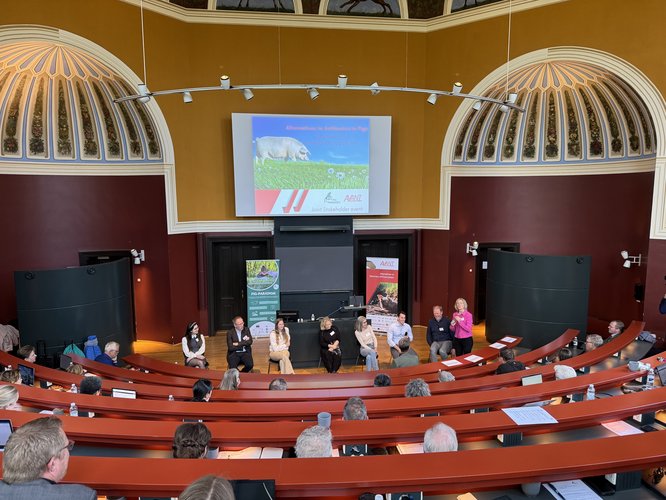PIG-PARADIGM and the industry’s challenge: A stakeholder’s perspective
By Shaila Ann Sigsgaard
Christian Fink Hansen, who heads up the Research Center for Pig Production at the Danish Agriculture & Food Council, joined the first part of PIG-PARADIGM’s annual meeting as a key industry stakeholder. Things kicked off with a joint session co-hosted by the EU project AVANT, where Christian joined others in discussing how to make pig farming more sustainable and cut down on antibiotic use. With experts from both initiatives sharing fresh research, the session turned into a lively exchange of ideas and strategies to push the industry forward and boost animal health.
What did you gain from participating in PIG-PARADIGM’s annual meeting, and what are your expectations for the ongoing research as a stakeholder in a political interest organization?
We fully support PIG-PARADIGM and would like to commend them for listening to us stakeholders. I also want to emphasize the importance of evidence-based research, highlighting the collaboration between PIG-PARADIGM and the EU project AVANT.
What’s particularly valuable about this initiative is the integration of real-world production data —samples from the real world—as is the case here alongside ‘high-level’ scientific inquiry. So theoretical research conducted while keeping it practical is a huge advantage. That balance is a major strength.
The pig industry is facing increasing pressure to reduce antibiotic usage. What challenges do pig farmers currently face?
We are certainly committed to helping reduce antibiotic resistance in pigs. The reality is that Danish pig producers must reduce their antibiotic usage by 8% by the end of 2027. In Denmark, we are already performing well in terms of veterinary drug usage compared to other countries with significant pig production. Unfortunately, our antibiotic consumption has increased due to the phase-out of veterinary zinc oxide, and this is where we need solutions. The weaning period remains a challenge, but this applies to all countries.
What are your thoughts on research into feed supplements?
There’s tremendous potential in optimizing feed strategies—fiber supplements for piglets and sows, for instance, could help prevent weaning diarrhea. Naturally, some of the key questions include: Does it work in all cases? Are there variations between pigs and disease pressure? How do piglets handle an increased fiber intake? How does it affect metabolism? Where can such production take place, and what are the costs? Is it scalable? And not least, is it profitable?"
As a representative of a political interest organization, I strongly support evidence-based research because that is what works in the long run. We do not want to do anything unless it is necessary or effective—otherwise, it would be a waste of resources. We must remain competitive.
From the industry's perspective, we also recognize that we need to do something different from what we have always done.
What would be the ideal outcome of PIG-PARADIGM?
The ideal scenario for us would be if we could design a pig with a healthy and robust microbiota to minimize weaning diarrhea. Another dream scenario would be to replace medication for piglets altogether.
Christian Fink Hansen remains optimistic about the industry’s ability to adapt. Sustainable solutions require a mix of scientific breakthroughs and practical implementation, ensuring that Denmark remains a leader in responsible pig farming.
Christian Fink Hansen is the sector director at the Research Center for Pig Production under the industry organization Danish Agriculture & Food Council . He is a former professor of pig production at the University of Copenhagen. He holds a Ph.D. in pig nutrition and production and a master’s degree in animal science from the University of Copenhagen, previously the Royal Veterinary and Agricultural University.
